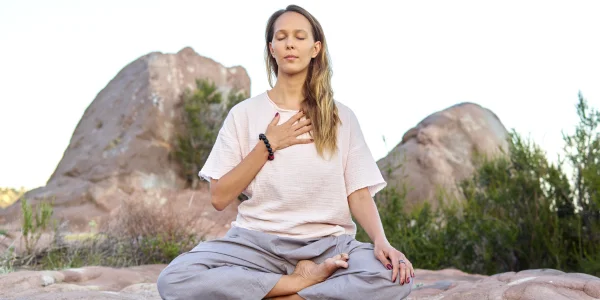Imagine you're feeling the weight of anxiety or depression pressing down on you, unsure of where to turn. Should you take medication? I hope it will help, but I'm uncertain of the potential side effects. Alternatively, you might have heard that meditation can alleviate stress and provide peace, but can it have a significant impact?
This predicament is quite common. Many individuals dealing with mental health challenges feel compelled to pick between medication and meditation.
But what if these two approaches, apparently worlds apart, might, in fact, complement each other and give even more strength to the foundation of mental and physical well-being?
This blog post will explore why it’s not about picking sides in the "meditation vs. medication" debate. Far from being a question of either-or, these two techniques may well be mighty partners in healing. Meditation and medication serve two different but complementary roles in managing mental health, opening up far more sustainable healing processes when joined together.
Understanding Medication
Medications, especially antidepressants, anti-anxiety medications, and mood stabilizers, are powerful tools in modern medicine. However, how do they actually function? Let's examine this.
An imbalance in an individual's brain chemistry can occur during periods of depression or anxiety. The neurotransmitters, which are responsible for communication between neurons, may not function properly. Medications help to address these imbalances and aid in the regulation of serotonin, dopamine, and other neurotransmitters that play a role in controlling mood.
For instance, Selective Serotonin Reuptake Inhibitors (SSRIs), often prescribed for depression, work by preventing the reabsorption of serotonin in the brain, thereby increasing its availability and promoting stabilization of mood.
Nevertheless, despite their effectiveness, medications often carry a stigma. Many fear that if they take medication, it is because one is not strong enough or that they will become dependent on a drug to feel alright. Such views govern hesitation in seeking help. The reality, however, is that medication stabilizes the mental health of many people, especially those with moderate and severe symptoms.
In biochemical imbalances, the mind cannot think its way out through positive thinking or meditation. Professional intervention is, therefore, necessary because a doctor or any other healthcare professional will always ensure that medication is taken as appropriate as the case may dictate and only when necessary. For others, medication might be the lifeline that they need to ensure stability and control over their mental health.
The Power of Meditation
While medication deals with the chemical aspect of mental health, meditation accesses the power of the mind. Meditation, especially mindfulness practices, can decrease stress and encourage relaxation by teaching the mind to stay in the present moment. This allows individuals to observe their thoughts without criticism. This mental clarity often leads to improved emotional control, aiding individuals in handling stress, anxiety, and negative emotions more efficiently.
Meditating activates parts of the brain that manage emotional control, such as the prefrontal cortex and the amygdala. Studies have indicated that regular meditation can even alter the brain's structure, increasing gray matter density in these areas, which can enhance emotional stability over time. Furthermore, meditation helps stimulate the parasympathetic nervous system, also called the "rest and digest" system, which counters the stress-induced "fight or flight" response, promoting a feeling of calm.
Beyond just mental health benefits, meditation has many other advantages. It has been proven that practicing mindfulness is associated with low blood pressure, reduced inflammation, and is useful in enhancing immune response. What a tremendous tool for stress management and health promotion.
But meditation is not the magic solution it has been made to be. It has limitations. While it was effective in reducing stress and coping with minor psychiatric symptoms, it could not correct chemical imbalances or cure severe mental illness. To someone debilitated with anxiety or depression, it may seem like trying to put out a forest fire with a garden hose--helpful but not enough.
The Synergy Between Meditation and Medication
In many ways, meditation and medication are more effectively used together than as an alternative for one another. Each serves a very different purpose in the healing process; collectively, they may be able to provide more holistic consideration in the domain of mental healthcare.
The first treatment therapy usually involves medication for a person experiencing more severe symptoms. It helps to provide an environment through which one can begin the healing journey. As it redresses chemical imbalances, it eases overwhelming anxiety or deep depression and makes patients more functionally manageable in everyday life. Once stability is achieved, meditation heightens the healing process by providing long-term mental clarity and emotional well-being.
As an illustration, emotional blunting is perhaps the most common side effect of antidepressants, which is you become less attached to feelings, whether they be positive or negative. Meditation has enabled more people to become aware of themselves and have a better connection with their inner states once those side effects come into play. Similarly, people who may be out of their nerves due to the current medications would also use meditation to prepare them to be able to be calm and relaxed.
The two practices of medication and meditation work hand in hand to address the physiological and psychological facets of recovery. Medication provides the chemical support required to equalize the brain, while meditation encourages mental discipline essential for emotional balance. It is that partnership through which people can control their health from both ends.
Examples of Successful Partnership
Let's examine a few real-life situations to gain a better understanding of how medication and meditation can complement each other.
Think about someone struggling with chronic anxiety. They might begin by using anti-anxiety medication to help cope with the overwhelming feelings that hinder their daily functioning. Once their anxiety is managed, they could integrate daily meditation into their routine to stay grounded and prevent the recurrence of symptoms. In this scenario, meditation becomes a long-term tool for maintaining the peace that medication initially offers.
Now consider a depressed patient who takes an antidepressant, lifting him out of a deep mental low. Once he reaches a more stabilized state of mind, he develops meditation to regulate his emotions even further and possibly to reduce the chances of future depressive episodes. The drug builds the foundation, while meditation maintains the balance of emotions .
Research supporting this combination is increasing. Studies indicate that the combination of psychotherapy, medication, and mindfulness-based therapies results in better outcomes than either of the single therapies for a patient suffering from anxiety and depression.
A study published in JAMA Psychiatry reported that among patients suffering from recurrent depression who followed mindfulness-based cognitive therapy (MBCT) in addition to medication, the incidence of relapse was lower than in patients undergoing only medication treatment.
How to Integrate Medication & Meditation into Your Life

Please remember the following information:
Consult Your Doctor
It is important to first consult with your healthcare provider. Have a conversation about how your mental health is affected by medication and whether adding meditation to your treatment plan could be helpful. Your provider can assist you in developing a personalized approach that fits your needs.
Start Small with Meditation
Sometimes, people are intimidated when they first start meditation. If you're new to the practice, it can be challenging to jump into long sessions. A good starting point, though, is five minutes a day, during which you may begin to feel the impact. Some apps, such as Headspace and Calm, offer excellent guided meditations for beginners.
Track Your Progress
As you begin to incorporate meditation into your life, you may find it helpful to start a journal or utilize a mental health tracking application. This will allow you to write down the impact of meditation on your mood and then compare that to how medication has been affecting you, helping you to see more clearly how these practices work nicely together.
Conclusion
The battle between meditation and medication doesn't require a winner. In reality, these two approaches are not opposed to each other. Instead, they can work together, creating a partnership that leads to more comprehensive healing. Medication addresses the chemical aspects of mental health, while meditation empowers the mind and supports emotional well-being.
With both forms of treatment, individuals can find a more balanced and sustainable path to recovery. If you or someone close to you is dealing with mental health problems, do not be afraid to explore the use of both meditation and medication with an open mind. Together, they could form a more powerful foundation for healing and get your life back in action.
If you have personal experience with medication, meditation, or both, share your story with us. Alternatively, if you're prepared to take the next step in your healing journey, consult your healthcare provider and see how these two powerful tools can work for you.
Solh understands. We offer a variety of features to help you invest in self-care.
Journaling for Self-Reflection: Sometimes, being unable to care for yourself can come from a lack of self-understanding. Solh's journaling feature allows you to explore your thoughts and feelings in a safe space. By reflecting on your experiences and desires, you can clarify what stops you from self-care.
Anonymous Support Groups: You are not alone. Solh's anonymous support groups connect you with others who understand the struggle. Share your experiences, find comfort in solidarity, and discover new perspectives on overcoming the hurdle to indulge in self-care.
Solh Buddy: Feeling lost or disconnected? Your Solh Buddy, a personalized virtual companion, is here to provide encouragement and support. It can offer prompts, celebrate your victories, and remind you of your strengths as you navigate the journey toward self-care.
Talk now: Sometimes, self-care can make you feel overwhelmed. Solh's Talk Now feature gives you access to dedicated counselors who can help you navigate such situations.
Solh believes in a unique approach to introducing self-care. We empower you to take charge of your well-being by offering a variety of tools. Explore Solh today and discover the power of self-reflection, connection, and support in overcoming any problem of the mind. You are not alone on this path.








